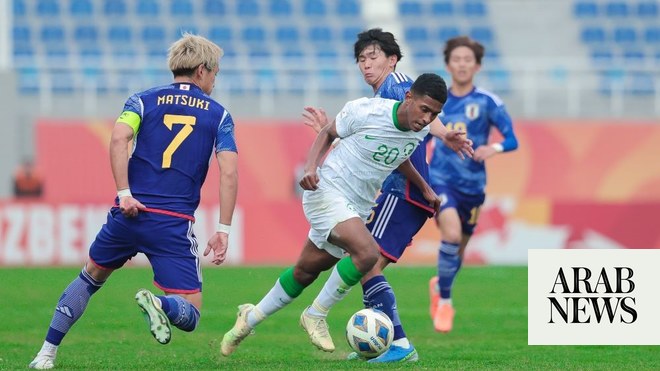
The Young Falcons will fly home on Tuesday after losing 2-1 to Japan at the Pakansari Stadium
Defeat follows U-19 heartache against Japan two years ago
WEST JAVA: Two years after losing on penalties to Japan in the final of the Under-19 Asian Championships, Saudi Arabia were vanquished once more by the Blue Samurai, this time in Monday’s Asian Games quarter-final.
The Young Falcons will fly home on Tuesday after losing 2-1 at the Pakansari Stadium, 60km south of Jakarta, after Yuto Iwasaki netted his second goal of the game 17 minutes from time to cancel out Abdullah Al-Yousif’s equalizer.
Five of Al-Shehri’s starting 11 featured in the 2016 final in Bahrain and the result had not been forgotten, with Ayman Al-Khulaif revealing pre-match that he was seeking revenge for the heartbreak. Much like his previous games at this month’s tournament, the Al-Ahli winger was central to the majority of his side’s creativity, drawing free-kicks and making runs to free up striker Haroune Camara.
“The team tried its best,” said Saad Al-Shehri, who refused to speak in English post-match despite having done so after each of his side’s previous victories. “This was a tough game for us, but we will train and try to improve. Reaching the quarter-finals at the Asian Games is a good achievement.”
Camara should have done better early on when faced with two defenders close to goal, but he failed to lift his head and pick out Nasser Al-Omran. He did not make the same mistake twice when, moments later, he played the ball wide to Abdulrahman Ghareeb, who dragged his shot past the far post.
“Our players played very well and with a strong mentality to go to the next round,” said Japan coach Hajjime Moriyasu. “It was very important for us to go aggressive at the start and fight our opponent. There was a mismatch, but our players were intelligent enough to deal with that.”
Iwasaki, who had earlier tested Mohammed Al-Yami from a similar position, opened the scoring on the half-hour when Daizen Maeda reacted quickest to a probing ball forward and laid off his teammate, who floated a right-footed curler back across the goalkeeper. Saudi felt aggrieved, thinking their opponents would put the ball out of play to allow medical treatment for Taishi Matsumoto.
Eight minutes later though, Saudi were level. A loose ball rattled around the penalty area before being snatched at and struck toward goal, hitting left-back Al-Yousif and looping up over the defense to land in the back of the net. It was a deserved equalizer and, shortly after the interval, Camara and Ghareeb combined again to work an opening, but once more, the latter fired off target.
“We conceded our goal because of poor defending, but in the second half we attacked more and had chances,” said Al-Shehri. “In the end though, Japan got stronger. We were second best ... it was a tough game.”
Japan coach Hajjime Moriyasu made early substitutions to inject more energy into his team and it paid off, with Japan dominating as the game grew on. Reo Hatate sneaked in behind the Saudi defense and knocked the ball past Al-Yami only for it to trickle wide, before the Saudi goalkeeper made an excellent acrobatic save from a Maeda header.
“We knew before the that that KSA have speed and technique and are a strong opponent so it was very important for us to control the risk,” said Kou Itakura, the Japanese captain. “We communicated well to play against them and our forward chased the ball very well, pressuring their defense. We played as a unit to win and were able to deliver the ball forward with success.”
With Abdullah Tarmin suspended, Al-Shehri had shifted the terrier-like Yousef Al-Harbi to right- back, but in the 73rd minute, Maeda was left with too much space on the flank and was able to cut in and pick out Iwasaki, who struck first time to give Japan the lead once more. It felt like a lesson in game-management — Tarmin had needlessly collected his booking while his team led 4-0 against China in the Round of 16.
“We conceded a goal, but our players played well enough to keep the rhythm and ensure we got the result,” said coach Moriyasu, who was not in charge in 2016.
“Two years ago against Saudi Arabia, most of the time we were defending and they created so many chances,” added Itakura, who started both games. “This time we held the ball and avoided too many shots. Saudi were strong before and now are even better, especially No9 [Camara], who offered them strength and speed. But Japan has also developed a lot in these two years.”
As the whistle blew, drawing an end to a memorable campaign for the Young Falcons, Al-Yami and Al-Yousif fell to the ground, inconsolable. Their adventure is over, but there are enough reasons to believe it is also just beginning.












